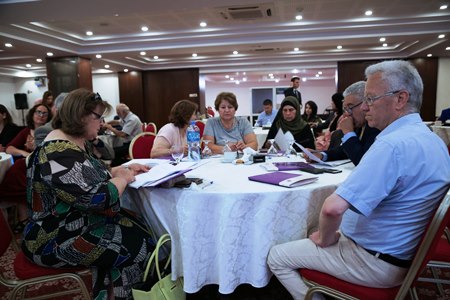|
Workshop in Ramallah to discuss 'The Constitutional Principles of the Palestinian Constitution'
Ramallah – MIFTAH, in partnership with the Constitutional Studies Center at An- Najah National University and Women Media and Development Association (TAM), held a workshop on June 25 on constitutional principles in Palestine. The meeting included a presentations and discussions of the democratic constitutional processes reflecting on the international experiences in the preparation of constitutions, the role of the media and CSOs in advocating for promoting constitutional principles and influencing the constitutional drafting processes and the follow up, furthermore the workshop included a critical reading of the May, 2016 Palestinian draft constitution. The meeting hosted expertise in the constitutional law; the international expert in constitutional law Dr. Francesco Biagi, Dr. Sanaa Alsarghali (Palestinian Constitutional law expert director of the Constitutional Studies Center) and the legal Tunisian expert Anwar Mansari, founding member of the Tunisian Women Voters League. The workshop was opened by Mr. Yousef Dajani, representing MIFTAH’s Board of Directors. “This workshop took place amide all of the challenges facing the Palestinians and their cause in the international arena, especially the so-called “economic peace talks” in Manama, which were rejected by the Palestinian people and leadership”. Dajani continued, “Today’s meeting is a continuation of the first stage of interventions conducted by MIFTAH and its partners on enhancing constitutional awareness and widening the constitutional culture in Palestine. This was based on broadening the circles of social dialogue on constitutional principles towards promoting a democratic approach in involving various social sectors in dialogue and discussions, including youth, women factions, civil society organizations and universities. The interventions included West Bank and Gaza Strip districts to stress on the importance of dialogue and discussion around democratic principles and values and ways to achieve them in a way that would guarantee respect for pluralism in Palestinian society.” Dajani reaffirmed MIFTAH’s and its partners’ efforts to support civil society through referring to various experiences at the international level which could enrich institutional work and help to determine the course of action for formulating constitutional provisions that guarantee citizens’ rights for all without discrimination. He also said this approach was aimed at promoting the values of democracy and equality, guaranteeing pluralism and establishing a legislative and legal climate that protects rights and freedoms and combats violence.” During the session, comparative experiences on drafting constitutions were discussed with focus on the constitutional situation in Palestine. This included a discussion on constitutional principles and comparative experiences from the various angles: the principle of ”Constitutionalism in Constitutes”, presented by Dr. Sana Sargali, which is based on three basic premises: the constitution is from the people, for the people; the principle of separating authorities and country-specific implementation; and three, constitutional building in new democracies. Then, a comparative study was presented by Dr. Francesco Biagi in which he focused on the most important stages of constitutional work, including: preparation, the importance of transparency of the process and the role of political parties in influencing articles of the constitution, followed by the stage of implementation, which he said was no less important than the preparation stage. Via Skype, Anouare Mnasrri discussed the role of civil society and women’s organizations in drafting the 2014 Tunisian constitution. She said the various sectors of Tunisian society partook in its drafting and stressed on the role of the media in supporting efforts made by women’s institutions in Tunisia, which she called “friendly media.” In her paper entitled, “The Constitution We Want: the Palestinian Case”, Dr. Sargali addressed the current situation in Palestine and the efforts to draft a Palestinian constitution that takes into consideration the exclusivity of the Palestinian case under occupation. This was followed by a lengthy discussion between the speakers and audience. In the closing session in which a wide sector of experts, public figures, activists and civil society representatives’ participated, civil society’s vision on constitutional principles and ways to implement them in Palestine was presented. Several recommendations were then made, including: importance of transparency in publishing the constitution; the need to determine the components of the political system through the constitution; confirming the constitutional principles based on the Declaration of Independence; setting mechanisms and criteria for joining the constitutional alliance; stressing on the role of the media; ensuring there is national ownership of the constitution and that the constitution coincides with international agreements; respect for the religious rights of minorities; ensuring the indivisibility of human rights; necessary coordination between the various viewpoints; and benefiting from Arab and international experiences at this level. This meeting was held as part of the interventions for the project “Support Women Participation in Public Life”, which MIFTAH carries out with support from the Norwegian Representative Office and is part of the organization’s “Policy Dialogue and Good Governance” program. The project interventions also contain a media campaign including public meetings and promotional materials aimed at awareness-raising on the principles of justice, equality and respect for pluralism in Palestinian society.

http://www.miftah.org |